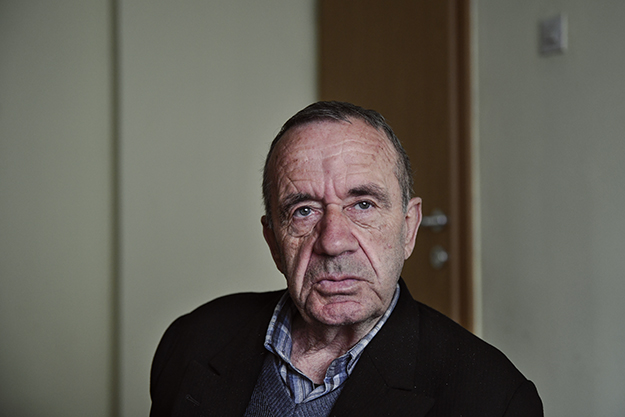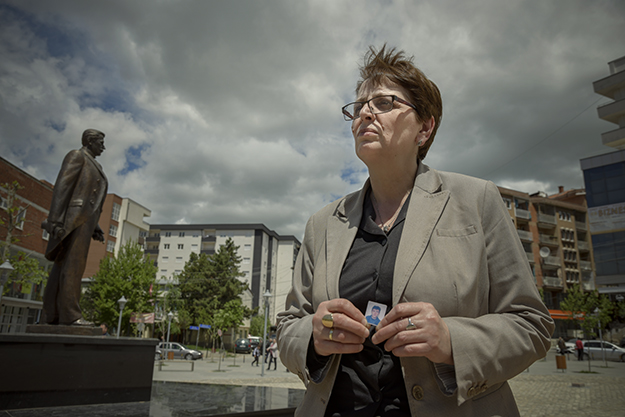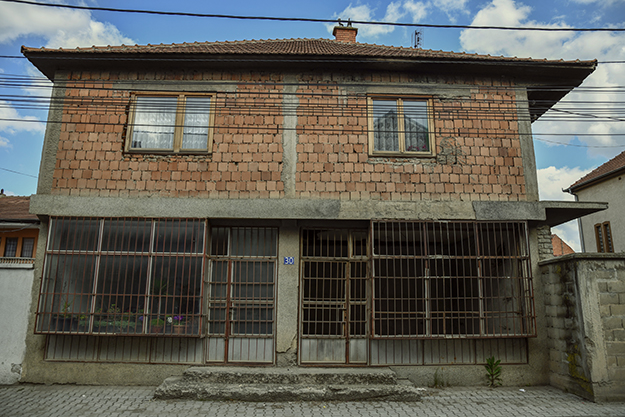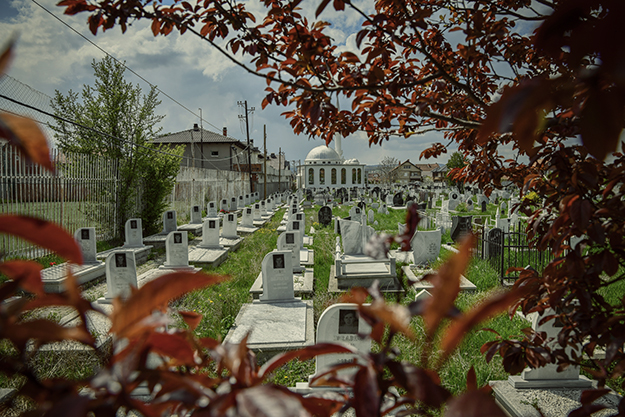Fatime and Musli’s story started similarly to those of many people their age. Forty-seven years ago they were introduced by relatives, and by the end of autumn 1972 they had decided to get married.
They agreed to create a family in the house they inherited from Musli’s father, which was located on Abdullah Shabani Street, not far from today’s Municipality of Vushtrri building.
Less than two years after getting married, Fatime and Musli Melenica had their first child, who they named Lutfi. In 1977, they had Shefki, and along the years came Avni, Arlinda and Florina. All five children grew up in that same house where the couple still live to this day.
Today though, the road bears another name, May 22 Street, a testament to the events that would change their lives forever.
Musli worked at the Education Directorate of the local municipality for many years and says that for him and Fatima, their children’s education was a priority. The first diploma in the household was acquired in 1989, when Lutfi graduated from the gymnasium.
But within less than two years, their joy would fade as Musli was fired from his job along with the majority of other Albanians who were working in Kosovo’s public institutions in the early ’90s and their dream of educating their children was thrown into jeopardy.
Around this time, Shefki started to study at the local gymnasium, where he stayed for four years before continuing his studies at the Economic Faculty of the University of Prishtina. By this time, lectures were being held in private homes as part of the parallel system of education, after Albanian students and professors had been expelled from state education structures.
During these years, Shefki’s brother and sisters continued their high school studies, also in the houses of local people.
Their 16-year-old neighbor Rrahim Shkreli went to the same school. He lived a bit further away, about 2 kilometers from May 22 Street, together with his parents, Xhemile and Hasan, his brother Bekim and his sisters Bukurie and Lirie.
Besides going to school, Rrahim occasionally went around the city’s cafés selling cigarettes, seeds, peanuts and Orbit chewing gum, which at the time was a luxury.

Hasan Shkreli’s teenage son Rrahim used to sell small items around Vushtrri’s cafés to help provide a little income for the family. Photo: Atdhe Mulla / K2.0.
His father Hasan tells how he managed to keep his job as a security guard, but how his wage was low and often delayed, making life difficult for the family of six. So every penny that Rrahim brought home made it easier for the family to make a living.
Hasan’s eldest son Bekim was seeking opportunities to leave the country. His parents supported his idea, influenced by the fact that by 1998 the situation in Kosovo was rapidly deteriorating. But shortly after he left, and before the war hit Vushtrri directly, the Shkreli family was hit by tragedy. It was to be the first of many.
In the summer of ’98, Xhemile suffered a stroke, dying instantly. Months later, their daughter Lirie died of cancer at the age of 27.
Hasan would face this adversity with Rrahim, who was also hoping to soon leave Kosovo, and Bukurie; by this time, Bekim had already left for Germany, where Lutfi — Fatime and Musli’s eldest son — had migrated a while back.
Quest for survival
As the Shkreli family mourned and the Melenica family worried about Shefki’s safety during his travels to study in Prishtina, Ajmane Ferati’s family was already face-to-face with the war on their doorstep. The household of 13 were thinking about leaving their home in Barë village after offensives from Serbian forces around nearby Mitrovica.
Ajmane fondly recalls her family’s life before these events. She remembers the time when they would sing and play the çifteli together with her older brother Driton, and the agricultural work that she would do with her parents and five sisters. She particularly recalls the birth of her younger brother Rrahman in 1981 because of the impact he would have on all their lives.
“He came of age early,” she recalls. “He made us all so happy.”
Ajmane remembers how Rrahman also liked the çifteli, and how his sisters would tease him and only let him play the def. She goes on to tell of Rrahman’s wish to go to Germany just before the start of the war, a wish that would never come true.

Ajmane Ferati-Shatrrolli recalls happy pre-war memories with her brothers, especially her young brother Rrahman’s passion for the çifteli. Photo: Atdhe Mulla / K2.0.
In October 1998, the family went to live in Vushtrri, a city familiar to Ajmane, who had finished high school there and had gone on to work in the city’s postal service for a few years. Ajmane recalls that in the next five months they changed house around 10 times before eventually, in April ’99, settling in the village of Studime on the edge of Vushtrri.
Although they came to Vushtrri to escape the war, their effort was to prove in vain.
A 2001 Human Rights Watch report highlights that Serbian forces had intensified their attacks around Vushtrri and Podujeva at this point and speaks of the “coordinated and systematic campaign to terrorize, kill, and expel the ethnic Albanians of Kosovo that was organized by the highest levels of the Serbian and Yugoslav governments in power at that time.”
On May 2, 1999 Studime and the surrounding villages were attacked by Serbian forces; 116 civilians were killed within a couple of hours.
Ajmane and her family managed to physically escape the May 2 massacre, although the scenes will forever be etched in her mind.
“We walked over bloody corpses,” says Ajmane as she recalls their escape from the village. “It would have been better if we had not survived.”
Together with hundreds of other survivors the family were forcibly marched to the facilities of the agricultural cooperative, which was located in the suburbs of Vushtrri.



